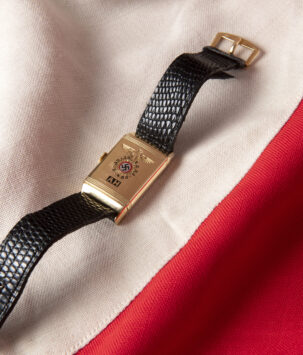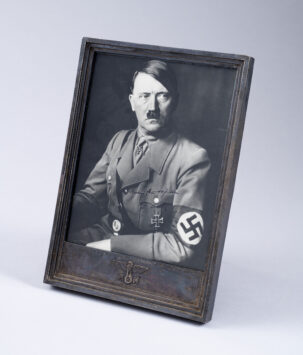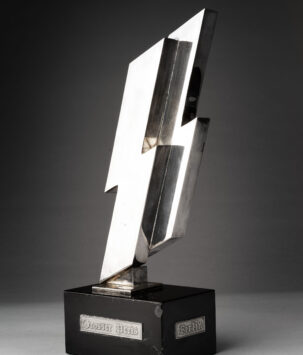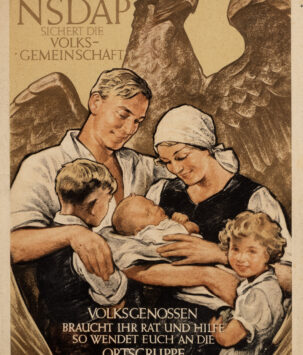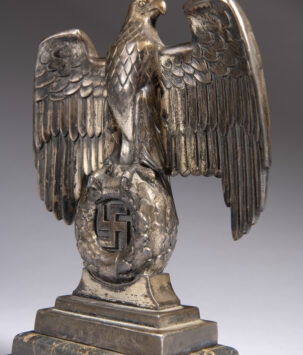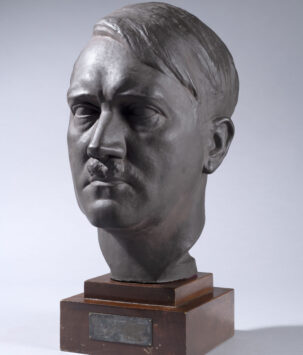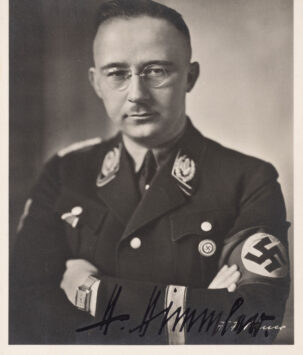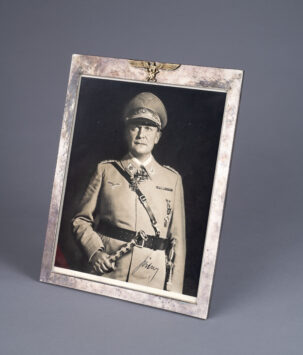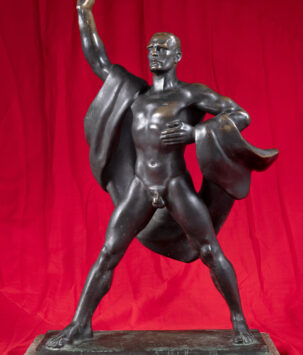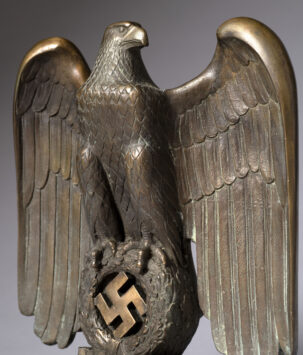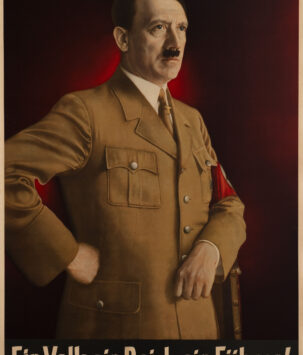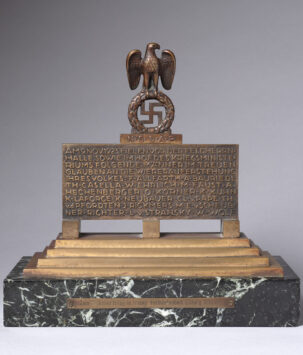Showing 1–12 of 20 results
-
A gold Andreas Huber reversible wristwatch gifted to Adolf Hitler himself on April 20th, 1933, his first birthday as Führer. One of a kind timepiece of unprecedented historical significance and conclusive provenance. Seized May 4th, 1945 at Hitler’s retreat in Berchtesgaden, Bavaria by a sergeant serving in the French 2nd Armored Division.
-
Autographed portrait of none other than Adolf Hitler himself within an official presentation frame emblazoned with an eagle and his initials “A H”. Photo by Heinrich Hoffman with dedication reading “Berlin dem 11 Mai” followed by the Führer’s signature.
-
The insignia of the SS is a pair of ancient Germanic runes. As the political vanguards of Nazism, the SS sought to distinguish themselves by incorporating esoteric symbolisms and mystical rituals to forge a sense of camaraderie within its ranks and ideological training was designed to foster an attitude of energetic ruthlessness, reflected in the undeniably aggressive posturing of their runic insignia.
-
The Volksgemeinschaft (people’s community) refers to a homogenous national community in citizens are united by a common culture, language and goal as well as a shared sense of identity that would overcome class conflict. It is characterized by solidarity, cohesion and equality, and expects the selfless devotion of every individual towards the betterment of the larger community which is considered an extension of oneself.
-
Eagle dated 1939 modeled after the massive iron eagles found on each side of the main podium of the Party Rally Grounds in Nuremberg. Designed by the preeminent sculptor Dr. Kurt Schmid-Ehmen who conceived the official design for the Third Reich’s national eagle.
-
A larger-than-life ceramic sculpture of Adolf Hitler manufactured by Allach Porcelain and designed by Ottmar Obermaier. Possesses an exceptional likeness to the Führer and emanates a certain mystical quality.
-
A signed portrait of Reichsführer-SS Heinrich Himmler. As head of the secretive paramilitary organization, the Schutzstaffel (SS), autographs of Himmler are considered exceptionally rare compared to that of more high-profile figures such as Hitler, Göring or other prominent military figures. As overseer of the many concentration camps and the Einsatzgruppen mobile death squads, he served as one of the main architects of the Holocaust. Himmler was guided by his interests in Germanic paganism, mysticism and the occult which he tied to his racialist philosophy in order to create a new, Germanic religion to replace christianity. Such esoteric rituals and symbolisms were incorporated into the SS, with the logo of the SS itself being comprised of two ancient Germanic sig (victory) runes.
-
Signed photograph of Hermann Göring contained within a period presentation frame. Depicts the Reichsmarschall half-length in full dress uniform c. 1940, his marshall’s baton and awards all readily visible. Presumed to be the first official photograph commemorating his 1940 promotion to ‘Reichsmarschall des Grossdeutschen Reiches’. The frame is adorned with an eagle clutching two crossed marshall’s batons and a swastika, a motif often used by the Reichsmarschall. Excellent condition.
-
Josef Thorak’s sculpture, through its celebration of the triumphant hero, depicts the philosophical antithesis to the coddling liberal notion of celebrating and enabling mediocrity. Sports and athletics took on a national-political character in Nazi Germany, as the cultivation of one’s physical prowess was an indispensable facet in creating the utopian vision of a “New Man” who would harness the ultimate potential of the human race. This will for self-improvement is a central trait in Nietzsche’s concept of a “master-morality” which served as the foundation upon which all fascist ideologies based their political philosophies upon. Nazism, in all its Darwinistic tendencies sought to fashion a new national culture rooted in this so-called “master-morality” to supplant the prevailing Judeo-Christian “slave-morality”.
-
A large, imposing, period bronze eagle set on a marble base embossed with the slogan “Ein Volk! Ein Reich! Ein Führer!” (One People! One Empire! One Leader!) referring to the spiritual unity of Germany through blood, soil and the Führer.
-
One of the most iconic posters of the Second World War, an election poster depicting the Führer and a famous Nazi slogan. Refers to the unshakable solidarity of Germany through blood, soil and the Führer.
-
A 1:10 scale bronze of the revered Mahnmal der Bewegung, a memorial commemorating the Munich Beer Hall Putsch of November 9th, 1923 which essentially acted as a headstone consecrating a sacred Nazi tomb for the fallen insurrectionists. The face of the monument bears the names of the 16 martrys, while the obverse reads “Und ihr habt doch gesiegt!” (And yet you triumphed!) celebrating the National Socialist spirit of martyrdom. Commissioned as a gift to Ludwig Schroff of Schroff-Druck in Augsburg.
